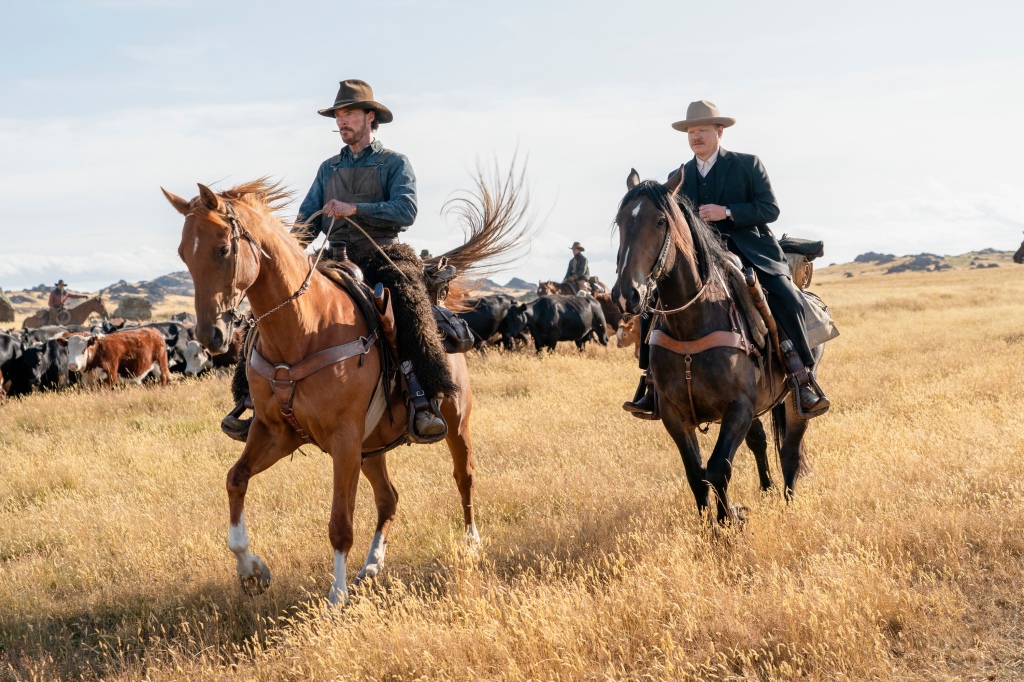I need to watch more movies by Jane Campion. That was my biggest takeaway from watching “The Power of the Dog,” one of a few westerns coming out this year, and even one of a few films set in Montana, something that is greatly appreciated by somebody who loves the landscape. It’s Campion’s first film since 2009’s “Bright Star.” The film is so gently told, which is a surprising contrast to the callous personality of its protagonist. Adapted from a 1967 novel of the same name by Thomas Savage, we see Benedict Cumberbatch, Jesse Plemons, and Kirsten Dunst give some of their best performances, alongside the film’s shining player Kodi Smit-McPhee.
Set on the backdrop of rural New Zealand, disguised as 1925 rural Montana (as a born Montanan you weren’t fooling me for a second), we do get some wonder visuals from cinematographer Ari Wegner (Zola, Lady Macbeth, In Fabric). Some of the shots over at the hills are just absolutely breathtaking. Mainly set at the ranch/childhood home of the Burbanks, there’s not much to take a gander at rather than the surrounding landscape, and the beautifully decorated but ghostly interior house.
Phil (Cumberbatch) and George (Plemons) Burbank do manage the successful cattle ranch together. Phil handles more of the ranch hand duties, whereas George is more on the business side making sure they settle up after dinner, and handling the finances of the ranch.

The Burbank brothers have been going at the ranch for 25 years, all the while sharing the same bed and any changes to their routine is surely bound to set Phil off in a rage. When there is even wind of the blooming relationship that George and Rose (Dunst), he sends word straight to their mother in disbelief. And when George brings Rose home as his wife, with her gentle son Peter (Kodi Smit-McPhee, we see Phil turn into an even darker presence. Calling Peter names, insulting his seeming lack of masculinity and spine.
When not on the ranch, Peter is off at school studying to be a doctor, like his father who had taken his life. And even when on the ranch, he’s making paper flowers, dissecting and studying fauna. But after Peter stumbles onto some explanation of Phil’s darkness, he starts to take him under his wing and give him a lot more attention. He teaches him how to ride a horse, tie a rope, and other things that Phil’s departed best friend/mentor Bronco Henry taught him when he was Peter’s age, a still developing boy.
We also know that Phil is not only an excellent rancher, but great at tormenting those around him and getting under their skin. From an incredibly frustrated Rose rehearsing piano and getting bombarded with Phil playing the same piece she has difficulty with on his banjo, to taking immense pleasure in catching Rose travel around the property to stashes of bourbon.
All of this is accompanied by another incredible score by Jonny Greenwood, who has proven time and time again that he sure knows how to write music. Mostly all stringed instruments in great Greenwood style. A dissonant guitar, with some lovely violins and cellos accompanying. Up there with the complexity and beauty of his “Phantom Thread” score, with some the eerie tone of “There Will Be Blood.” It does incredibly well to set the mood for the runtime of the story, and only ever serves as a tool for the film and never a distraction. But it does lead to think about where the film is going.
Phil starts to surmise that there was more than just friendship with the often mentioned and adored Bronco Henry. With his own memorial and countless stories, it’s not hard to know they were close. But with Smit-McPhee’s ability to be hard to read, it’s difficult to tell what events are destined for these characters. It’s still, at this point, hard to tell whether Phil and Peter are developing a genuine bond with one another, or if Phil is playing his hand at making Peter into something his mother can only recognize as an extension of himself. But Peter isn’t as foolish as Phil likes to think he is, and he knows more than Phil thinks he does.
Benedict Cumberbatch has always been an incredibly interesting on-screen force. And when put to the task of playing a shady, cold, and damaged man, he puts his incredibly charming characteristics to work to help you see him in the role even more. Kirsten Dunst portrays Rose as an incredibly delicate woman, playing into the roles set for the time; cleaning and helping around while the men work, but also showing the effects of such roles with her spiral into alcoholism and fear of the environment surrounding. And Jesse Plemons plays a similar role to what we might be used to. His quietness and neutrality deceive, making him seem like he might just be a victim to Phil’s toxicity, but he does hold firm in his positions. Among the principal cast, Thomas McKenzie plays a young maid, with an incredibly limited screen presence, and Genevieve Lemon plays a role as the housekeeper for the Burbank ranch, a return collaborator for Jane Campion. Overall, the cast was really great, yet did feel somewhat limited by their screen time in comparison to Benedict and Kodi.
The movie plays incredibly well, and while some might find it a bit dragging, it’s hard to take eyes off the screen for the inevitable tragedy that befalls its characters. “The Power of the Dog” releases in limited locations on November 17, and will be available for all Netflix subscribers on December 1.
My rating:


